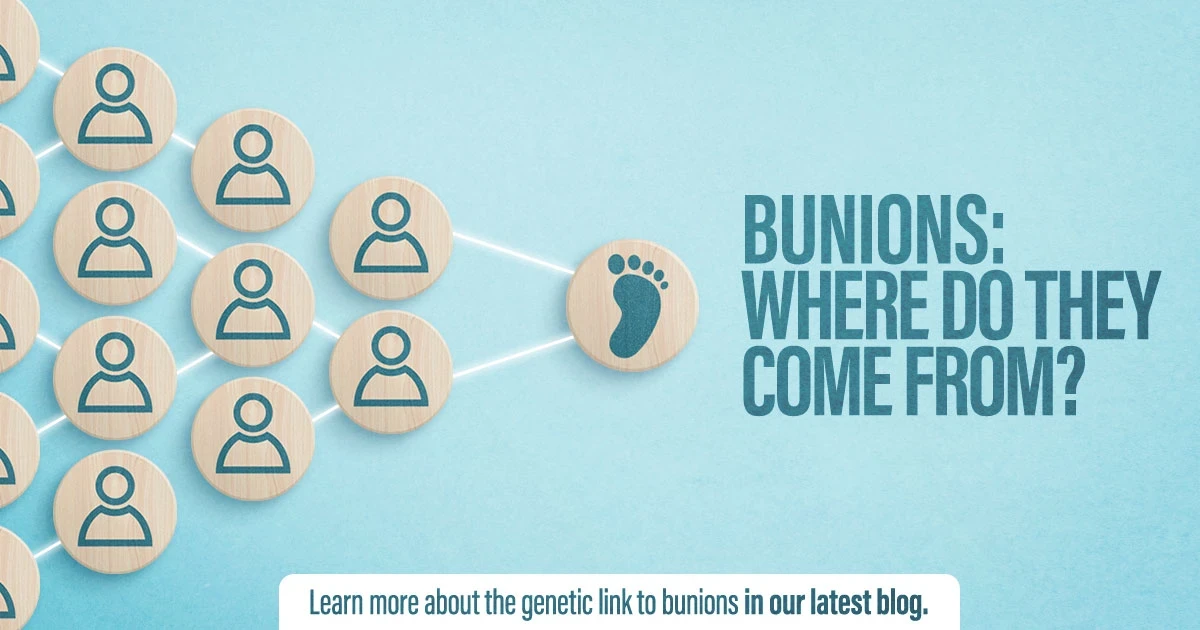Bunions are a common foot condition that affects millions of people worldwide. They are characterized by a bony bump at the base of the big toe, causing the joint to protrude and lean outward. While factors like footwear and foot mechanics can contribute to their development, scientific research has revealed that bunions can also be hereditary. In this blog, we will learn more about bunions, explore their hereditary nature, and discuss the implications for individuals prone to developing this condition.
What Are Bunions?
A bunion, also known as hallux valgus, is a foot deformity that affects the joint at the base of the big toe. The condition is marked by the deviation of the big toe toward the other toes, leading to a bony bump on the side of the foot. Over time, the joint enlarges, causing pain, discomfort, and difficulty walking or wearing certain types of shoes.
Understanding the Hereditary Aspect:
While bunions can be caused by various factors such as repetitive stress, arthritis, or improper footwear, research has shown a significant genetic component in their development. The hereditary nature of bunions suggests that individuals with a family history of the condition are more likely to develop them themselves.
Several studies have identified specific genes that may contribute to the development of bunions. Researchers have found that specific foot shapes, foot mechanics, and connective tissue abnormalities can be inherited and increase the risk of developing bunions.
Family History:
Observing your family history is important when it comes to understanding your risk of developing bunions. If someone in your family has had bunions, it may indicate an increased likelihood of developing the condition. While genetics alone does not guarantee the development of bunions, they can make an individual more susceptible to the factors that contribute to their formation.
It’s important to note that hereditary factors are not the only causes of bunions. Environmental factors, such as footwear choices, occupation, and specific activities, can also affect their development. Wearing tight or narrow shoes, high heels, or shoes that do not adequately support the foot can exacerbate the risk of developing bunions, even in individuals with a genetic predisposition.

Managing and Preventing Bunions:
Although hereditary factors can increase the risk of developing bunions, there are steps individuals can take to manage the condition and prevent its progression:
1. Choose Proper Footwear: Opt for shoes that provide adequate support, have a wide toe box, and allow your toes to move freely.
2. Use Orthotic Devices: Custom-made or over-the-counter orthotic devices can help alleviate pressure on the bunion, improve foot alignment, and reduce discomfort.
3. Maintain a Healthy Weight: Excess weight can strain the feet, increasing the risk of bunion development. Maintaining a healthy weight can help minimize the stress on your feet.
4. Exercises and Stretching: Specific exercises and stretches can strengthen the muscles around the foot and improve foot mechanics, reducing the likelihood of bunion progression.
5. Regular Foot Examinations: Regular visits to a podiatrist can help monitor any changes in foot structure and provide early intervention if necessary.
Bunions can be a source of pain and discomfort for individuals who develop them. While various factors contribute to their formation, including footwear and mechanics, the hereditary aspect should not be overlooked. Understanding the genetic predisposition to bunions can help individuals take preventive measures and seek appropriate treatment. By being proactive and adopting healthy foot care practices, individuals can minimize the impact of bunions and maintain overall foot health.
What We’re Doing to Help
Bunions can be painful, but many are deterred from surgery due to post-surgical pain. Many treatment options available are not always effective, and some are even addictive. Trovare Clinical Research is currently enrolling those who are interested in bunion removal surgery to be a part of currently enrolling clinical trials. Adults 18 – 80 years of age who are considering bunion removal surgery may qualify. Qualified participants may see a study doctor at no cost, have access to study medications, and receive compensation for time and travel. Click here to learn more, or call us at 661-663-3096.

